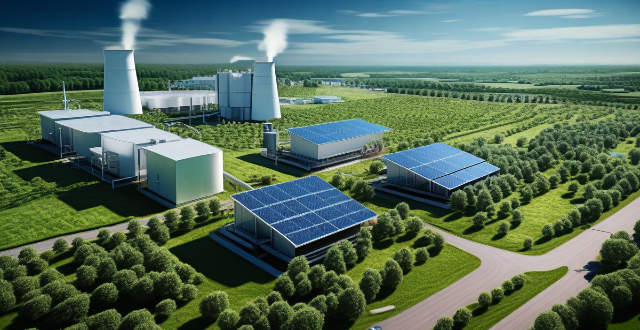Renewable energy sources like solar, wind, hydropower, biomass, and geothermal power play a crucial role in enhancing industrial energy efficiency. They offer benefits such as reduced greenhouse gas emissions, lower operating costs, and increased reliability. By adopting these technologies, businesses can reduce their reliance on fossil fuels, increase energy independence, and contribute to a more sustainable future.

Renewable Energy Sources and Industrial Energy Efficiency Improvements
Renewable energy sources play a crucial role in enhancing industrial energy efficiency. They offer numerous benefits, including reduced greenhouse gas emissions, lower operating costs, and increased reliability. Here's how renewable energy sources contribute to industrial energy efficiency improvements:
Solar Power
- Reduced Energy Costs: Solar power reduces the reliance on fossil fuels, leading to lower energy costs for businesses.
- Increased Energy Independence: By generating their own electricity, companies can become more self-sufficient and less vulnerable to price fluctuations in the energy market.
- Improved Energy Security: Solar power systems provide a reliable source of energy that is not affected by grid outages or other disruptions.
Wind Power
- Stable Energy Prices: Wind power provides a stable source of energy that is not subject to price volatility like fossil fuels.
- Low Maintenance Costs: Once installed, wind turbines require minimal maintenance, reducing overall operating costs.
- Reduced Carbon Footprint: Wind power generates electricity without producing harmful emissions, helping companies meet sustainability goals and reduce their carbon footprint.
Hydropower
- High Energy Efficiency: Hydropower plants have high efficiency rates compared to other renewable energy sources, making them an attractive option for industries looking to improve their energy efficiency.
- Low Operating Costs: Hydropower plants have relatively low operating costs due to the lack of fuel requirements and minimal maintenance needs.
- Reliable Energy Supply: Hydropower plants provide a consistent and reliable source of energy, reducing the risk of power outages and ensuring uninterrupted production processes.
Biomass Energy
- Waste Reduction: Biomass energy converts organic waste into usable energy, reducing waste disposal costs and promoting sustainable practices.
- Local Energy Production: Biomass energy can be produced locally, reducing transportation costs and increasing energy independence for businesses.
- Carbon Neutrality: Biomass energy produces fewer net emissions than fossil fuels, helping companies achieve carbon neutrality and meet environmental regulations.
Geothermal Energy
- High Energy Efficiency: Geothermal power plants have high efficiency rates compared to conventional power plants, resulting in significant energy savings for industries.
- Stable Energy Prices: Geothermal energy provides a stable source of energy that is not subject to price volatility like fossil fuels.
- Reliable Energy Supply: Geothermal power plants provide a consistent and reliable source of energy, ensuring uninterrupted production processes and reducing the risk of power outages.
In conclusion, renewable energy sources offer numerous benefits for improving industrial energy efficiency. By adopting these technologies, businesses can reduce their reliance on fossil fuels, lower operating costs, increase energy independence, and contribute to a more sustainable future.